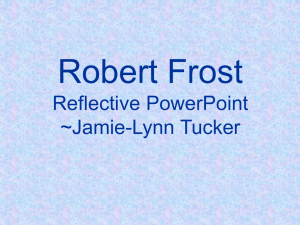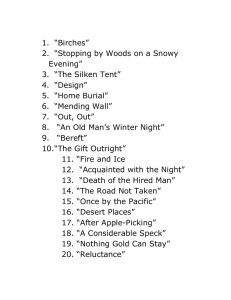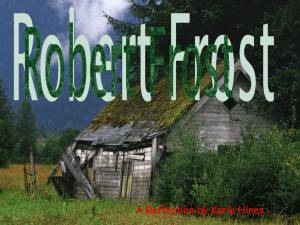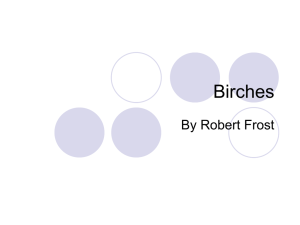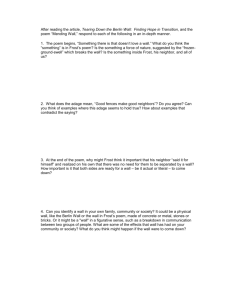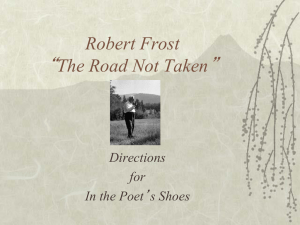Matt Kehoe
advertisement
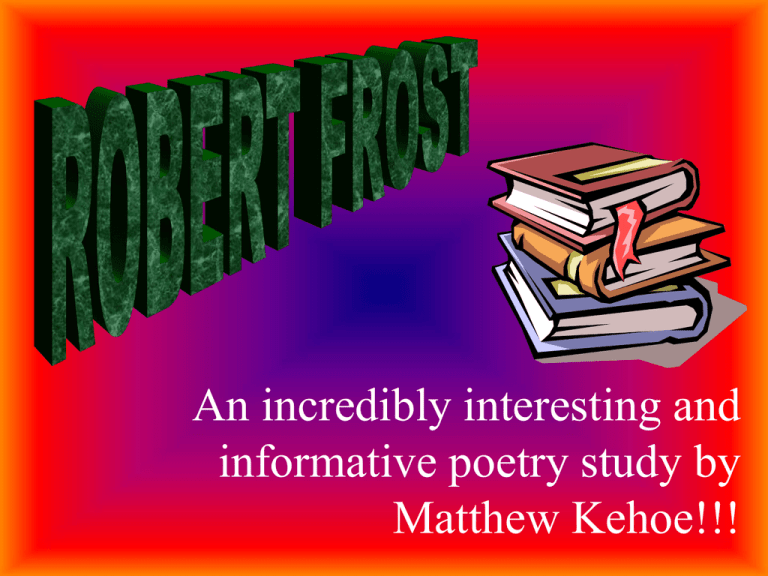
An incredibly interesting and informative poetry study by Matthew Kehoe!!! Having read four of Robert Frost’s works of poetry, I have come to develop a liking for his sense of style and subtlety. His use of language and literary elements intrigues me, and this has prompted me to use him and his work for my poetry study. I will begin with a short biography, then the four poems which I have studied. Born: March 26, 1874 Died: January 29, 1962 Robert Frost was born in San Francisco. He was one of the greatest American poets of the 20th century, winning the Pulitzer Prize four times. His father died when he was 11. At this point, his family moved to Massachusetts. Frost attended high school here, then enrolled in Dartmouth College. He stayed for less than one semester before returning to teach school, work in a mill, and be a news reporter. In 1895 he married Elinor White, who he had attended high school with. In 1912 he and his family moved to England, where he could devote himself entirely to his writing. He became successful almost immediately. He was soon famous on both sides of the Atlantic. He enjoyed success for his entire life, right up until his death in the early 60’s. AFTER APPLE-PICKING My long two-pointed ladder's sticking through a tree Toward heaven still, And there's a barrel that I didn't fill Beside it, and there may be two or three Apples I didn't pick upon some bough. But I am done with apple-picking now. Essence of winter sleep is on the night, The scent of apples: I am drowsing off. I cannot rub the strangeness from my sight I got from looking through a pane of glass I skimmed this morning from the drinking trough And held against the world of hoary grass. It melted, and I let it fall and break. But I was well Upon my way to sleep before it fell, And I could tell What form my dreaming was about to take. Magnified apples appear and disappear, Stem end and blossom end, And every fleck of russet showing dear. My instep arch not only keeps the ache, It keeps the pressure of a ladder-round. I feel the ladder sway as the boughs bend. And I keep hearing from the cellar bin The rumbling sound Of load on load of apples coming in. For I have had too much Of apple-picking: I am overtired Of the great harvest I myself desired. There were ten thousand thousand fruit to touch, Cherish in hand, lift down, and not let fall. For all That struck the earth, No matter if not bruised or spiked with stubble, Went surely to the cider-apple heap As of no worth. One can see what will trouble This sleep of mine, whatever sleep it is. Were he not gone, The woodchuck could say whether it's like his Long sleep, as I describe its coming on, Or just some human sleep. BIRCHES When I see birches bend to left and right Across the lines of straighter darker trees, I like to think some boy's been swinging them. But swinging doesn't bend them down to stay. Ice-storms do that. Often you must have seen them Loaded with ice a sunny winter morning After a rain. They click upon themselves As the breeze rises, and turn many-coloured As the stir cracks and crazes their enamel. Soon the sun's warmth makes them shed crystal shells Shattering and avalanching on the snow-crust Such heaps of broken glass to sweep away You'd think the inner dome of heaven had fallen. They are dragged to the withered bracken by the load, And they seem not to break; though once they are bowed So low for long, they never right themselves: You may see their trunks arching in the woods Years afterwards, trailing their leaves on the ground, Like girls on hands and knees that throw their hair Before them over their heads to dry in the sun. But I was going to say when Truth broke in With all her matter-of-fact about the ice-storm, I should prefer to have some boy bend them As he went out and in to fetch the cows-Some boy too far from town to learn baseball, Whose only play was what he found himself, Summer or winter, and could play alone. One by one he subdued his father's trees By riding them down over and over again Until he took the stiffness out of them, And not one but hung limp, not one was left For him to conquer. He learned all there was To learn about not launching out too soon And so not carrying the tree away Clear to the ground. He always kept his poise To the top branches, climbing carefully With the same pains you use to fill a cup Up to the brim, and even above the brim. Then he flung outward, feet first, with a swish, Kicking his way down through the air to the ground. So was I once myself a swinger of birches. And so I dream of going back to be. It's when I'm weary of considerations, And life is too much like a pathless wood Where your face burns and tickles with the cobwebs Broken across it, and one eye is weeping From a twig's having lashed across it open. I'd like to get away from earth awhile And then come back to it and begin over. May no fate willfully misunderstand me And half grant what I wish and snatch me away Not to return. Earth's the right place for love: I don't know where it's likely to go better. I'd like to go by climbing a birch tree And climb black branches up a snow-white trunk Toward heaven, till the tree could bear no more, But dipped its top and set me down again. That would be good both going and coming back. One could do worse than be a swinger of birches. MENDING WALL Something there is that doesn't love a wall, That sends the frozen-ground-swell under it, And spills the upper boulders in the sun, And makes gaps even two can pass abreast. The work of hunters is another thing: I have come after them and made repair Where they have left not one stone on a stone, But they would have the rabbit out of hiding, To please the yelping dogs. The gaps I mean, No one has seen them made or heard them made, But at spring mending-time we find them there. I let my neighbor know beyond the hill; And on a day we meet to walk the line And set the wall between us once again. We keep the wall between us as we go. To each the boulders that have fallen to each. And some are loaves and some so nearly balls We have to use a spell to make them balance: 'Stay where you are until our backs are turned!' We wear our fingers rough with handling them. Oh, just another kind of out-door game, One on a side. It comes to little more: There where it is we do not need the wall: He is all pine and I am apple orchard. My apple trees will never get across And eat the cones under his pines, I tell him. He only says, 'Good fences make good neighbors'. Spring is the mischief in me, and I wonder If I could put a notion in his head: 'Why do they make good neighbors? Isn't it Where there are cows? But here there are no cows. Before I built a wall I'd ask to know What I was walling in or walling out, And to whom I was like to give offense. Something there is that doesn't love a wall, That wants it down.' I could say '.Elves' to him, But it's not elves exactly, and I'd rather He said it for himself. I see him there Bringing a stone grasped firmly by the top In each hand, like an old-stone savage armed. He moves in darkness as it seems to me Not of woods only and the shade of trees. He will not go behind his father's saying, And he likes having thought of it so well He says again, "Good fences make good neighbors." I forgot him and let his little fear THE WOOD-PILE Carry him off the way I might have gone, Without so much as wishing him good-night. Out walking in the frozen swamp one gray day He went behind it to make his last stand. I paused and said, 'I will turn back from here. It was a cord of maple, cut and split No, I will go on farther- and we shall see'. And piled- and measured, four by four by eight. The hard snow held me, save where now and then And not another like it could I see. One foot went through. The view was all in lines No runner tracks in this year's snow looped near it. Straight up and down of tail slim trees And it was older sure than this year's cutting, Too much alike to mark or name a place by Or even last year's or the year's before. So as to say for certain I was here The wood was gray and the bark warping off it Or somewhere else: I was just far from home. And the pile somewhat sunken. Clematis A small bird flew before me. He was careful Had wound strings round and round it like a bundle. To put a tree between us when he lighted, What held it though on one side was a tree And say no word to tell me who he was Still growing, and on one a stake and prop, Who was so foolish as to think what he thought. These latter about to fall. I thought that only He thought that I was after him for a featherSomeone who lived in turning to fresh tasks The white one in his tail; like one who takes Could so forget his handiwork on which Everything said as personal to himself. He spent himself the labor of his axe, One flight out sideways would have undeceived him. And leave it there far from a useful fireplace And then there was a pile of wood for which To warm the frozen swamp as best it could With the slow smokeless burning of decay. After Apple Picking This poem was a wonderful piece of writing, and a pleasure to read. It seemed to me to symbolize the journey of life. The ladder seems to represent life, and the apples all the experiences life has to offer. The barrel would be the experiences which the man in the poem has gone through with. At the point he says “and there’s a barrel that I didn’t fill” and “:there may be two or three apples I didn’t pick” he is expressing remorse for all the things he hasn’t done in life. However, he is done with apple picking, meaning his life is over. He will not be experiencing anything anymore, and is ready for it to end. The apples which were turned to cider were the bad experiences in his life, the ones he picked but dropped, or that he tried but didn’t go well. All in all, an incredible poem telling the basic story of all our lives. There isn’t enough time in life, and we all regret missing out on a few apples. Birches This poem, like “After Apple Picking”, is another metaphor for life, but with a slightly different moral. I believe that the birches symbolize the flexibility our lives have, and that we don’t need to follow the set paths our society says we do. The bending of the birches is like bending the rules in life, however it can take a shaking of our lives for us to realize we can do this, like the ice storm which caused the birches to bend. I think he was saying with climbing the trees until they bent back to the ground that you can bend the rules in life and you’ll still end up at a normal place. You’ll still end your life in the same way whether you follow society or not, o do what you like. Mending Wall This poem was mostly about the human wish for freedom. The wall seemed to symbolize restrictions that we and the others around us place on our lives. “Good fences make good neighbours” seems to be saying that others will accept you more if you follow society’s ideas and don’t do things your own way. Everyone will see you as normal and trustworthy, but in the end, isn’t it only what you think of yourself that matters? The wall isn’t necessarily a great thing because it inhibits you from doing the things you really want to. Everyone wants to be free, just others seem more willing to fight for it. The Wood-Pile I did not find any prominent metaphors for life, in this particular poem. This work seems to be Frost’s take on a special effects movie. His main idea seems to immerse the reader in the imagery he can create simply with his words, and he does an incredible job with it. Each thing he sees, the bird, the wood pile of course, the swamp, each comes alive in our mind as we reed this poem. Robert Frost’s mastery of the English language is not censored at all in this beautiful piece of writing. It captures the mind and takes you on a wonderful ride through nature without stepping out your front door. I read a response on “Mending Wall” by George Montiero, which can be found at the link at the bottom of this page. I will give my opinion on that response on the following slide! http://www.english.uiuc.edu/maps/poets/a_f/frost/wall.htm George Montiero has wonderfully expressed Robert Frost’s ideas which are evedent in this poem, however he may have overanalyzed a bit. Taking this poem as far back as an ancient Roman ritual may be a bit too far. I think that the poem is much more general, probing into mens’ minds more than their history. It looks more at our lust for freedom and lack of boundaries, but also our compulsive behavior of creating them everywhere in our lives. Other than that one fact, I believe George hit the nail on the proverbial head here, and obviously has a great understanding of Frost’s work.
